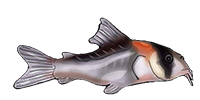Which flow mode for hypancistrus tanks?
Which flow mode for hypancistrus tanks?
Currently my hypancistrus tanks are utilizing a straightforward jebao wavemaker on constant flow mode for additional surface agitation and flow. I have just torn down my office reef tank and now have a spare maxspect gyre that I intend to use to replace the jebao so that the flow will be even throughout the tank and not just a single jet from the wavemaker. Should I continue to run the gyre on constant flow mode too, or would the hypancistrus enjoy other flow modes like wave, pulse, random etc more?
- TwoTankAmin
- Posts: 1491
- Joined: 24 Apr 2008, 23:26
- I've donated: $4438.00!
- My cats species list: 6 (i:0, k:0)
- My BLogs: 2 (i:0, p:48)
- Location 1: USA
- Location 2: Mt. Kisco, NY
- Interests: Fish and Poker
Re: Which flow mode for hypancistrus tanks?
The oxygen levels are more important than strong current. I have Hypans spawning in tanks with minimal flow using Poret foam cubes and/or Matten filters. I also have tanks with more flow using pumps and/or powerheads.
Bear in mind that while these fish live in rivers with current, and are adapted to do so, that they spawn and "sleep" in places which are sheltered from strong currents.
Bear in mind that while these fish live in rivers with current, and are adapted to do so, that they spawn and "sleep" in places which are sheltered from strong currents.
“No one has ever become poor by giving.” Anonymous
“Everyone is entitled to his own opinion, but not to his own facts.”" Daniel Patrick Moynihan
"The good thing about science is that it’s true whether or not you believe in it." Neil DeGrasse Tyson
“Everyone is entitled to his own opinion, but not to his own facts.”" Daniel Patrick Moynihan
"The good thing about science is that it’s true whether or not you believe in it." Neil DeGrasse Tyson
Re: Which flow mode for hypancistrus tanks?
Thanks, I do understand that and the primary purpose of the wavemaker are for surface agitation to increase oxygenation. I was just hoping to give them a flow pattern that they would prefer - e.g. marine species hide amongst reef rocks but prefer random or wave patterns over constant flow
- stuby
- Posts: 532
- Joined: 14 Jul 2009, 03:52
- I've donated: $25.00!
- My images: 1
- My cats species list: 1 (i:1, k:0)
- My aquaria list: 1 (i:0)
- Spotted: 1
- Location 1: USA
- Location 2: Big Rapids, MI.
Re: Which flow mode for hypancistrus tanks?
I agree Chris! To many people think current and oxygen levels are the same thing. I have bred a lot of different plecs in tanks that don't have a lot of current.... but I always have a lot of oxygen in the water.TwoTankAmin wrote: ↑18 May 2019, 03:12 The oxygen levels are more important than strong current. I have Hypans spawning in tanks with minimal flow using Poret foam cubes and/or Matten filters. I also have tanks with more flow using pumps and/or powerheads.
Bear in mind that while these fish live in rivers with current, and are adapted to do so, that they spawn and "sleep" in places which are sheltered from strong currents.
Take care,
Chuck
- Lycosid
- Posts: 191
- Joined: 20 Aug 2016, 21:18
- My cats species list: 7 (i:0, k:0)
- Spotted: 4
- Location 1: United States
- Location 2: North Carolina
Re: Which flow mode for hypancistrus tanks?
Marine species probably prefer wave-like patterns because that's their natural environment. High-flow rivers are constant flow, though, so at first approximation that would be a good way to go.illumnae wrote: ↑18 May 2019, 10:54 Thanks, I do understand that and the primary purpose of the wavemaker are for surface agitation to increase oxygenation. I was just hoping to give them a flow pattern that they would prefer - e.g. marine species hide amongst reef rocks but prefer random or wave patterns over constant flow
In-tank objects can then allow the fish to choose to be in or out of the high-flow areas.
Re: Which flow mode for hypancistrus tanks?
I ended up going with random mode and so far it seems to be working out ok




